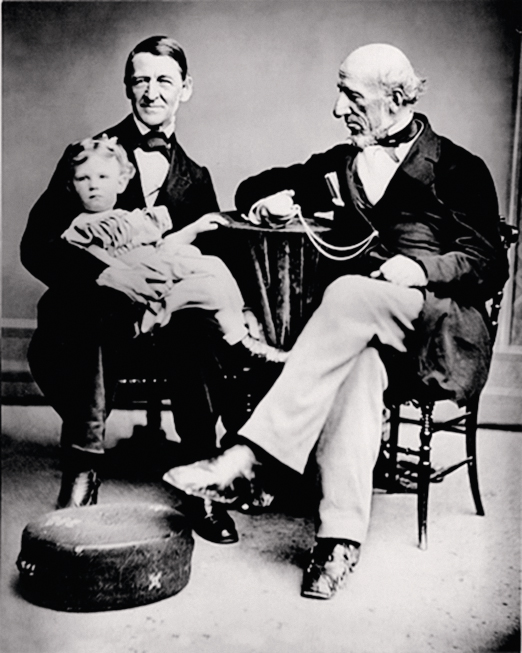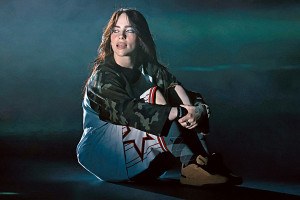Life After Charlotte

From left, Ralph Waldo Emerson and John Murray Forbes with their first grandchild, Sukey Forbes’s great-grandfather Ralph Emerson Forbes, in 1868.
As the weekend on Naushon came on, more people showed, and I had the pleasant sensation of being embraced by the clan. I held to the family tradition, playing the part dry-eyed and stoic, and yet I continued to feel the same wrenching divide: relieved that I wasn’t coming unglued, tortured for not coming unglued.
A central tenet of the Forbes guide to life is that, no matter what, the summer’s activities should go on. Staying busy, like “staying cheerful,” may be an effective way of “managing” unruly emotion, but it’s a woefully inadequate response to grief.
This particular Saturday afternoon had been set aside for the annual games on horseback that went by the fancy colonial British name Gymkhana. For decades, the idea has been to engage everyone—all ages and abilities—in relay races, pattern races, whatever anyone could think up. The entry-level event is Red Light/Green Light, which the youngest rider is always allowed to win. Cabot was in the Egg and Spoon Race, the next level up, in which contestants ride in a circle, reverse, trot, and cantor, all while holding an egg in a spoon. The egg falls—you’re out. He was also in an event in which a team of riders has to cantor, reverse, and so on while not breaking a ribbon of toilet paper strung between them. There were relay races—four riders on a team, one horse per team—and Musical Sacks, in which contestants rode in a circle to the accompaniment of my cousin Irving on the bassoon. When the music stopped, the riders had to dismount and jump onto one of the diminishing number of grain sacks distributed around the ring.
I sat on the sidelines from start to finish, watching with a frozen, disconnected smile. Whenever I could see that I was supposed to cheer, the effort was so forced that I felt as if my internal organs were being ripped apart.
Michael remained the more stereotypically grief-stricken parent, always visibly shaken, moving like a zombie, staring silently. I was very aware of how shattered he looked, but also relieved that no one seemed to be judging him. Of course, that left plenty of room for me to feel that they were judging me.
Toward the end of the day, Cabot and Beatrice joined in the big, all-ages soccer game in the pasture near our house, so once again we did our part and were there for them on the sidelines.
But the evening’s entertainment—a sing-along over at Shore House hosted by my aunts—I knew was going to be just too much for me. After dinner Michael took the kids; I stayed at Mansion House and went up on the roof, where a trapdoor leads out onto an old platform that had once been a proper widow’s walk. I’ve always liked to go up there in the morning with a cup of tea, or sometimes in the evening with a glass of wine. On the Fourth of July there’s often a gang of us perched up on the ridge, watching 14 different fireworks displays from Rhode Island to Hyannis to Martha’s Vineyard.
That night, I was still so fearful of the numbness that I relished my ability to simply drink in the sounds of the bugs and the birds and the smell of the ocean. I had so many things on my mind—worries about our marriage, worries about the kids—that I tried to blot everything out and just not think. The wind had come around and I could hear the halyards clinking against the masts in the harbor, hear the sheep rustling around in their pens, the horses in the pasture. What I couldn’t bear to hear was the southwest wind carrying the singing over from Shore House. I could handle the voices coming together in harmony and singing rounds like “Dona Nobis Pacem,” but it was a silly one, “The Cat Came Back,” that really got to me. It had been Charlotte’s favorite.
The next morning I got up early and went on a rampage cleaning closets, trying to organize things that had resisted organization for half a century. The linen closet was a real archaeology project, with moth-eaten sheets and tablecloths embroidered with my great-great-great-grandmother’s initials, and spoons with handles engraved with a single “F,” and a tatami mat from when my great-great-uncle Cam was ambassador to Japan. I packed up close to 50 mismatched teacups and saucers and even more crystal of various types along with stacks upon stacks of china from the China trade. Most were chipped beyond their ability to be useful or even decorative, but no one had dared get rid of them.
Given the number of “aunties” who could always drop by to inquire about a missing this or that, getting rid of anything could be problematic. So all the things I wanted to deep-six I simply labeled and put in the cellar.
While conducting these excavations, I couldn’t help thinking about this strange world that had made me who I am. There was so much I loved about my family, and yet I also knew that my family was the source of the emotional restraint that was just now holding me in a hellish limbo. The reluctance, perhaps inability, to express emotion had been woven into every cell in my being. But for all the focus on tradition, was there really nothing in all that family history that could actually help me find my way?
In my parents’ world, strong emotions suggested weakness, and even a too easy smile was considered flaky. “Californians show their teeth too much,” my father told me once. Part of that disdain is habit, part a cultivated Brahmin style, and some a reasonable response to face-freezing New England winters. But I suspect it also harbors a deeply entrenched fear. The passions are biological, after all, and we all know where biology leads.
To this day, I have never heard either of my parents raise their voices to anyone, or use foul language. When we were children, any lively expressions of emotion on our parts were met with a drawn face, tight lips pursed in a line, lowered chin, elevated eyes staring right at us. In Milton, if we were overexuberant we would be sent outside to run laps around the house three times. The message: Come back when you can hold yourself together.
The same tight reins held for any other desire, including ambition, and yet there were also the high demands that follow from that adage “To whom much is given, much is expected.” It was as if we were supposed to have been born with the effortless ability to write Latin and speak French and possibly a bit of German, play a musical instrument, sing, be a quick wit with a sarcastic sense of humor, have strong opinions on a variety of issues and always defend them in a calm and well-articulated argument, and put ourselves last while always playing as a team. “I need” and “I want” were never to be spoken. It was simply not important what you needed or wanted. It was the vast indifference of nature on a smaller scale. It’s not the individual that counts. It’s the family that will live on, the tradition.
We were supposed to be slim and physically fit, not from vulgar exercise at a gym, but from tennis, horseback riding, gardening, polo, clearing trails, or hauling in the mainsheet. But for me, there was always a disconnect as to how one was supposed to learn how to do any of these things, because if you did them poorly you would be met with that pained and withering look of disapproval, pity, shame. The emotional stiffness was mingled with a perpetual spiritual fluidity, which was, I guess, par for the course set by Emerson’s elevation of self-reliance to the apotheosis of virtues, and nature as the text for every lesson worth learning. “The foregoing generations beheld God and nature face to face,” he wrote. “We, through their eyes. Why should not we also enjoy an original relation to the universe?”
If there was any place where Emerson’s idealization of nature made sense, it was this island, which was even more “supernaturally” idyllic when I was a child.
But summering on Naushon and being to this particular manner born also meant a lot of what we called “CB,” for “character building.” It began with spring work details to help to open up the houses, launch floats and boats and docks, split wood, and clear trails with a chain saw. “We will walk on our own feet,” Emerson wrote. “We will work with our own hands.”
At one time these chores also involved managing more than a thousand sheep that roamed the meadows all summer. In the spring and fall, every family member over the age of 10 would go out “sheeping” to help drive the flock to the east end of the island to be penned and sheared and cared for. The sheep that managed to stay out would become known as “woolies” because their coats just kept growing. After the roundup each year there was usually a campfire on the beach and a big sing-along. But then the coyotes took over in the ’80s, and now there are only about 50 sheep on hand, kept mostly as lawn ornaments.
In my youth, it was my grandfather David who was the straw boss in all this. “A good worker” was his highest compliment. Although we had one of the oldest phone systems in the United States, the phones were rarely used. The exception was the Saturday-morning phone calls we would get dragooning all on hand for a clearing party up island. We cousins would jockey to avoid answering, because whoever picked up would be in charge of rounding up the crew to meet at the farm with loppers, saws, and pruners for the long, hot tractor ride to the work site. These work details would run all morning and end on the beach with a skinny dip led by my grandfather, and then a small lunch of fruit, eggs, and cheese.
For all of us, Grandfather included, Naushon was our one escape from emotional collars buttoned way too tight. A Naushon summer included the freedom to be a rebellious teen without doing any damage. It’s a Forbes rite of passage to be brought home in a wheelbarrow by your cousins after drinking too much beer in the woods. Those were the kinds of memories I’d wanted Charlotte to have. (Well, perhaps not as a passenger in the wheelbarrow.)
In trying to assimilate these divergent family traditions I was like that Steve Martin character having a fistfight with himself. As I look back now at the note I left in the guest book just two weeks after Charlotte’s death, I find something chilling in my peculiarly WASP detachment:
August 22–30
It has been a memorable summer. We relocated the Bigham home (from Woodside, California, to Weston, Massachusetts) in June and then had an idyllic month of July here at Mansion House. We had a lovely early August weekend on Nashawena with the Miller family (Jacki Forbes’s daughter Nicole) and then a wonderful stormy weekend for Shareholders here with the whole crew. Friday night’s potluck is fast becoming a tradition and gets better each year.
Our late August has been hit with enormous sorrow as our beloved middle child, Charlotte Saltonstall Bigham, died suddenly and unexpectedly at age 6½. We believe the cause was spontaneous malignant hyperthermia made worse by a possible underlying neuromuscular condition. We are all still reeling from this loss but are comforted by the family support we have felt from everyone. It is our hope to create a memorial garden here in her name. Charlotte will be deeply missed and always remembered.
Sukey and Michael,
Cabot and Beatrice.
Following the entry, seven-year-old Cabot drew a small figure of a little girl and wrote “Charlotte” underneath it.
For years, leaving Naushon meant standing on the bow of the ferry with the wind in my face, looking toward Woods Hole. This time I had to stand on the stern looking back. I felt as though I was being ripped away from my mother’s breast, and I just could not stop the tears. I could have hidden on the island forever, huddled in this small, secure, and limited world where the rules were clear, and where we’d already had the confrontations with our sorrow and made the adjustments. God only knew what life was going to demand of us back in the real world.
We still had two children to take care of, and Michael had a demanding job, so we tried to gear back in as August drew to a close and “back to school” required more and more of my attention.
As we struggled to return to “ordinary life,” I didn’t want Beatrice or Cabot to become resentful or jealous of their dead sister, so I tried hard not to make a shrine of her room. I also made it clear that they were free to play with Charlotte’s toys. As often as not, going into Charlotte’s room, Beatrice would say to me, “Charlotte’s in here. She’s hiding…but she’s in here.” I wanted to believe it so much that I’d play along. I was working on rational coping mechanisms, but irrational was definitely gaining ground.
On September 21, on a new moon tide, a great white shark swam into the lagoon on Naushon and was stuck there for 10 days. This was a 14-foot female circling around in Charlotte’s favorite swimming hole, the place where we’d jumped from the bridge to get shushed along by the tide. This time there wasn’t the slightest doubt—Charlotte was sending me a message.
I pulled the kids out of school and we drove down and got on the ferry with the news helicopters overhead and reporters swarming onto the beaches from small boats. They were trespassing, crowding onto the far side of the lagoon, but I didn’t care.
The fact that this shark was getting international attention simply confirmed the importance I assigned to it. I waded out and stood on a rock in the lagoon with this great white swimming 4 feet away. I was completely mesmerized, oblivious to the danger, snapping pictures and gasping in awe each time it circled past. It wasn’t until I had the film developed that I really saw the giant eye looking right at me.
Had I come unglued? Lost my mind? For Melville’s Ahab, it was the “whiteness of the whale” that most horrified him. But for me, I saw even this fierce creature through Emersonian eyes.
The rock where I was perched was a rock that Charlotte and I had jumped off of, laughing and splashing as we entered the then-safe waters only a few weeks prior. But now this representative of the wild, uncharted territories was trapped right here, unable to get back to where she belonged. Was Charlotte going through something similar in a parallel universe? The marine biologists on site calmed the shark and tagged her with a monitor and nurtured her until they could coax her out of the lagoon and through the small channel back out into the open water. Two days after she found her freedom, she managed to dislodge her tracking device and it floated to the surface. Maybe this magnificent animal just didn’t want to submit to rational study or even detailed observation.
Maybe she preferred to remain a mystery, fading back into her natural environment.
From The Angel in My Pocket: A Story of Love, Loss, and Life After Death, by Sukey Forbes. Reprinted by arrangement with Viking, a division of Penguin Group (U.S.A.). © 2014 by Sukey Forbes.


